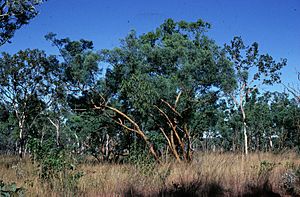Kimberley yellowjacket facts for kids
Quick facts for kids Kimberley yellowjacket |
|
|---|---|
 |
|
| Eucalyptus lirata at Gibb River Station | |
| Scientific classification | |
| Genus: |
Eucalyptus
|
| Species: |
lirata
|
The Eucalyptus lirata, often called the Kimberley yellowjacket, is a type of small tree or a multi-stemmed bush known as a mallee. This plant is special because it is endemic, meaning it grows naturally only in the Kimberley region of Western Australia. It has rough, stringy bark on its trunk and most of its branches. Its adult leaves are shaped like a spear or are slightly curved. The flowers are white and grow in groups of three, later turning into small, cup-shaped fruits.
Contents
What the Kimberley Yellowjacket Looks Like
The Kimberley yellowjacket is usually a small tree or a mallee, which means it has many stems growing from the ground. It typically grows to be about 3 to 8 meters (10 to 26 feet) tall. This plant has a special woody swelling underground called a lignotuber. This lignotuber helps the plant regrow if there's a fire or damage.
Its bark is rough, brownish, and can be stringy or flaky on the main trunk and most of the branches. Young plants and new shoots that grow after damage have leaves shaped like an egg or an oval. These leaves are about 4.5 to 9.5 centimeters (1.8 to 3.7 inches) long and 2.4 to 6 centimeters (0.9 to 2.4 inches) wide.
The adult leaves are longer and thinner, shaped like a spear or slightly curved. They are usually a dull bluish or yellowish-green color on both sides. These leaves are about 6.5 to 14 centimeters (2.6 to 5.5 inches) long and 0.7 to 2.6 centimeters (0.3 to 1 inch) wide. They narrow down to a leaf stalk called a petiole, which is about 0.6 to 2 centimeters (0.2 to 0.8 inches) long.
Flowers and Fruit
The flower buds of the Kimberley yellowjacket grow in groups of three. They are found where the leaves meet the stem. Each group of buds sits on a short stalk called a peduncle, which is about 0.5 to 0.8 centimeters (0.2 to 0.3 inches) long. Each individual bud has its own tiny stalk, called a pedicel, about 0.1 to 0.4 centimeters (0.04 to 0.16 inches) long.
When the buds are ready to open, they are shaped like a cylinder. They are about 0.7 to 1.1 centimeters (0.3 to 0.4 inches) long and 0.4 to 0.5 centimeters (0.16 to 0.2 inches) wide. The top part of the bud, which covers the flower, is called an operculum. It can be shaped like a cone or be rounded.
The Kimberley yellowjacket flowers from September to January. Its flowers are white. After the flowers bloom, they turn into woody fruits. These fruits are called capsules and are shaped like a cylinder or a cup. They are about 0.7 to 1.1 centimeters (0.3 to 0.4 inches) long and 0.5 to 1 centimeter (0.2 to 0.4 inches) wide. The parts that open to release the seeds are usually close to the rim of the fruit.
How it Got its Name
Scientists give every living thing a unique two-part name. This system is called taxonomy. The scientific name Eucalyptus lirata was first officially described in 1921. It was named by a botanist named Joseph Maiden in his book A Critical Revision of the Genus Eucalyptus.
The second part of the name, lirata (which is called the specific epithet), comes from the Latin word lira. This word means "furrowed" or "grooved." The ending -atus means "having" or "possessing." So, the name probably refers to the plant's rough, furrowed bark.
Where it Grows and Lives
The Kimberley yellowjacket is found in the Kimberley region of Western Australia. It grows on ridges, hills, and flat areas called plateaux. You can find it as scattered trees or as part of open woodlands. This is its natural habitat, which means the type of environment where it normally lives and grows.
Is it Endangered?
The conservation status tells us how safe a plant or animal is from disappearing. The Western Australian Government's Department of Parks and Wildlife has classified this eucalypt as "not threatened." This means it is not currently at risk of becoming extinct.

